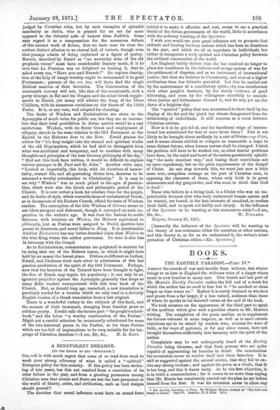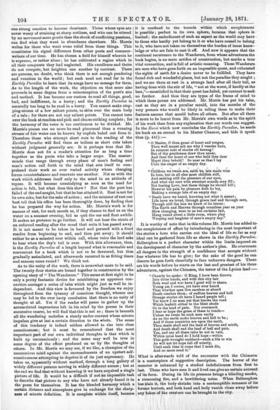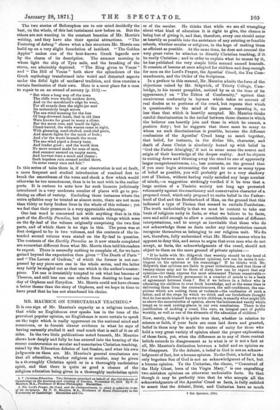BOOKS.
THE EARTHLY PARADISE.—PART IV..
AMIDST the sounds of war and trouble from without, this winter brings to us here in England the welcome voice of a singer whose music is now familiar to many ears. This fourth and last part of Mr. Morris's Earthly Paradise makes the full end of a work for which the author has no need to fear lest it "be mocked or clean forgot as time wears on." Rather it is surely destined to win love and praise from a far larger, if a less valued, audience than those of whom he speaks in his farewell verses at the end of the book.
We took occasion on the appearance of the third part to speak of the qualities which give such a peculiar charm to Mr. Morris's writing. The completion of the poem enables us to supplement the former estimate in some respects, as well as to meet certain objections apt to be raised by readers who, whether for want of faith, or for want of patience, or for any other reason, have not brought themselves sufficiently into harmony with the spirit of the author.
Complaints may be not unfrequently heard of the Earthly Paradise being tiresome, and that from persons who are quite capable of appreciating its beauties in detail. On examination the accusation seems to resolve itself into three branches. It is said or suggested against the several stories, that they fail to ex- cite any strong interest ; and against the poem as a whole, that it is too long, and that it wants unity. As to the first objection, it is in truth a commendation ; for it comes to no more than saying that Mr. Morris has consistently carried out the plan he set before himself from the first. It was his intention never to allow any • The Earthly Paradise: a Poem By William Morris, Author of "The Life and Death of Juan." Pert IV. London: F. B. Ellis. IMO. one strong emotion to become dominant. Those whose eyes are never weary of straining at sharp outlines, and who can be stirred by no movement more gentle than the shock of conflicting passions, can find what they want in abundance elsewhere. Mr. Morris writes for those who want some relief from these things. This constitutes his signal difference from other poets and romance- writers of our time. He has chosen a field for himself wherein he is supreme, or rather alone ; he has cultivated a region which in all their conquests they had neglected. His excellence and theirs do not compete, but heighten one another by contrast. There are persons, no doubt, who think there is not enough pondering and vexation in the world ; but such need not read far in the Earthly Paradise to learn that its songs have no message for them. As to the length of the work, the objection on that score also proceeds in some degree from a misconception of the poet's aim and method. It has become our custom to read all things, good, bad, and indifferent, in a hurry ; and the Earthly Paradise is assuredly too long to be read in a hurry. You cannot make step- ping-stones of a few salient points, to skim over the main body of a tale ; for there are not any salient points. You cannot turn over the book at random and pick and choose striking couplets ; for the harmony of the verse is too continuous to be divided. Mr. Morris's poems can no more be read piecemeal than a running stream of fair water can be known by cupfuls baled out from it. Therefore those who attempt short cuts to the reading of the Earthly Paradise will find them as tedious as short cuts taken without judgment generally are. It is perhaps true that Mr. Morris does not fix a reader's attention for as long a time together as the poets who take a larger scope. The master- minds that range through every phase of man's feeling and man's action call forth in the mind that sets itself to com- prehend their work an ever varied activity whose changing forces counterbalance and renovate one another. Not so with the work which addresses itself only to the mind in an attitude of repose. It will become unsatisfying as soon as the need for action is felt, but what does this show ? Not that the poet has failed of the end sought, but that he has attained it. Rest is not for its own sake, but for the sake of action ; and the minister of rest can best tell that his office has been thoroughly done, by finding that he has prepared the way for action. Mr. Morris's work is for seasons of rest, for such moods as, if they chance to find us on the water on a summer evening, bid us quit the oar and float awhile. It makes no pretence to go further. It will not bear the strain of an enforced reading after the mood that suits it has passed away. It is not meant to be taken in hand and perused with a fixed resolve from beginning to end, and then put away ; it should rather be as a minstrel ever within call, whose voice the lord asks to hear when the day's toil is over. With this allowance, then, is the Earthly Paradise of a length beyond what is reasonable and convenient for a book which is not to be devoured, but thus gradually assimilated, and afterwards recurred to as fitting times and seasons come round ? We think not.
As to the unity of the work, there is somewhat more to be said. The twenty-four stories are bound together in construction by the opening story of The Wanderers." This seems at first sight to be only a pretty fantastic device for establishing an apparent con- nection amongst a series of tales which might just as well be in- dependent. And this view is favoured by the freedom we enjoy throughout from the tyranny of conscious thought, whence one may be led to the over hasty conclusion that there is no unity of thought at all. Yet if the reader will pause to gather up the accumulated impressions left in his mind by the poems in their successive course, he will find that this is not so ; there is beneath all the wandering melodies a steady under-current whose minute impulses give at last a certain direction to the whole. The sense of this tendency is indeed seldom allowed to rise into clear consciousness ; but it must be remembered that the most important part of our own individual thoughts is that which is built up unconsciously ; and the same may well be true in some degree of the effect produced on us by the thoughts of others. In Mr. Morris we may see, if we like, a champion of the unconscious mind against the encroachments of an upstart self- consciousness attempting to deprive it of its just supremacy. He takes us, apparently without method, through a long gallery of widely different persons moving in widely different scenes ; but at the end we find that without knowing it we have acquired a single picture of life. It would be a difficult if not an impossible task to describe that picture to any who have not already found it in the poem for themselves. It has the blended harmony which a certain distance and atmosphere give in exchange for the sharp- ness of minute definition. It is complete within itself, because it is confined to the bounds within which completeness is possible ; perfect in its own sphere, because that sphere is limited; the embodiment of such an aspect as the world may have to those who hardly yet belong to it or who have ceased to belong to it, who have not taken on themselves the burden of inner know- ledge or who are fain to cast it off. And now it appears that the continual recurrence to the Wanderers, from whose adventures the book begins, is no mere artifice of construction, but marks a true vital connection, and is full of artistic meaning. These Wanderers- are men who have gone forth on an impossible quest, and exhausted the sights of earth for a desire never to be fulfilled. They have found rich and wonderful places, but not the paradise they sought ; and we see them at rest in a strange land after all their toil, as having done with the stir of life, "not at the worst, if hardly at the best,"—unsatisfied in that their quest has failed, yet content to seek no further. And thus they are types of the frame of mind to which these poems are addressed. Mr. Morris has put his tales, cast as they are in a peculiar mould, into the mouths of the very persons who would be likely in telling them to make their features assume that mould before all others. But after all there is more to be learnt from Mr. Morris's own words as to the spirit of his work than from any explanation that our words can suggest. In the Envoi which now concludes the Earthly Paradise, he sends his book on an errand to his Master Chaucer, and bids it speak thus (p. 441) :— s 0 Master, 0 thou great of heart and tongue, Thou well mayst ask me why I wander here, In raiment rent of stories oft besung ! But of thy gentleness draw thou anear, And then the heart of one who held thee dear Mayst thou behold! So near as that I lay Unto the singer of an empty day.
"Children we twain are, saith he, late made wise In love, but in all else most childish still, And seeking still the pleasure of our eyes, And what our ears with sweetest sounds may fill ; Not fearing Love, lest these things he should kill ;.
Howe'er his pain by pleasure doth he lay, Making a strange tale of an empty day.
"Death have we hated, knowing not what it meant ;
Life have we loved, through green leaf and through serer
Though still the less we knew of its intent: The Earth and Heaven through countless year on year Slow changing, were to us but curtains fair, Hung round about a little room, where play Weeping and laughter of man's empty day.'
It is worthy of note that in this volume Mr. Morris has added to- the completeness of effect by introducing in the most important of the stories a hero who carries out the ideal of life so far as any ideal can be gathered from life as shown in the Earthly Paradise. Bellerophon is a perfect character within the limits imposed on the development of character by the author's plan. He overcomes all dangers in the strength of a confidence that accepts without fear whatever life has to give ; for the sake of the good he can discern he goes forth cheerfully to face unknown dangers. These are his words before he starts on the last and greatest of his three adventures, against the Chimera, the terror of the Lycian land :—
" Cheerly he spake : 0 King, I have been thrown
Into thine hands, and with this city fair Both weal and woe have I good will to share.
Young am I certes, yet have ever heard That whether men live careless or afeard Death reaches them; of endless heaven and hell Strange stories oft have I heard people tell ; Yet knew I no man yet that knows the road Which leadeth either to the bleat abode Or to the land of pain. Nor overmuch
I fear or hope the gates of these to touch—
Unless we twain be such men verily As on the earth make heaven and hell to be ; And if these countries are upon the earth, Then death shall end the land of heaven and mirth, And death shall end the land of hell and pain.
Yea, and say all these tales be not in vain, Within mine hand do I hold hope—within
This gold-wrought scabbard—such a life to win
As will not let hope fall off utterly, Until such time is come that I must die, And no more need it."
What is afterwards told of the encounter with the Chimers is a masterpiece of suggestive description. The horror of the monster is enhanced by a studied indefiniteness from first to last. Those who have seen it and lived can give no certain account of its form. During its life its presence brings a blinding smoke, a consuming fire, and a bewildering noise. When Bellerophon has slain it, the body shrinks into a contemptible remnant of its former horrors, and both head and body vanish clean away before- any token of the creature can be brought to the city. The two stories of Bellerophon are to our mind decidedly the best, on the whole, of this last instalment now before us. But the others are not wanting in the constant beauties of Mr. Morris's writing, and they have also their special attractions. "The Fostering of Aslaug " shows what a fair structure Mr. Morris can build up on a very slight foundation of incident. "The Golden Apples" makes one of the best-known Greek legends new by the charm of its description. The summer morning in whose light the ship of Tyre sails, and the breaking of the storm, are admirably depicted. "The Ring given to Venus" and " The Hill of Venus" both show the splendours of the Greek mythology transformed into weird and distorted aspects under the fitful light of medimval tradition, and thus exercise a certain fascination of their own. Here is a meet place for a man to repair to on an errand of sorcery (p. 213) :—
" But when a long way off the town
The cliffs were wholly sunken down, And on the marshland's edge he went, For all sounds then the night-jar sent Its melancholy laugh across
The sea-wind moaning for the loss
Of long-drowned lands, that in old time Were known for great in many a clime.
But the moon rose, and 'neath its light, Cloud-barred, the wide wastes came in sight, With gleaming, sand-choked, reed-clad pools, And marsh-lights for the mock of fools ; And o'er the waste beneath the moon The sea-wind piped a dreary tune, And louder grew ; and the world then No more seemed made for sons of men, And summer seemed an empty name, And harvest-time a mock and shame ; Such hopeless ruin seemed settled there, On acres sunny once and fair."
In this series of tales there is, if our observation is not at fault, a more frequent and studied introduction of resolved feet to break the smoothness of the verse and check a flow which would otherwise be too monotonous, than is to be met with in the earlier parts. It is curious to note how far such licences judiciously introduced in a very moderate number of places will go in pro- ducing an effect of variety. Excluding those instances where the extra syllables may be treated as almost mute, there are not more than thirty or forty broken lines in the whole of this volume ; yet we feel that their presence is a very appreciable advantage.
Our last word is concerned not with anything that is in this part of the Earthly Paradise, but with certain things which were on the fly-leaf of the volume originally comprising the two first parts, and of which there is no sign in this. The poem was at first designed to be in two volumes, and the contents of the in- tended second volume were stated on the fly-leaf in question. The contents of the Earthly Paradise as it now stands completed are somewhat different from what Mr. Morris then told his readers to expect. There is assuredly nothing to complain of, for we have gained beyond the expectation then given "The Death of Paris" and "The Lovers of Gudrun," of which the former is not sur- passed by any piece save one in the whole series, and the latter may fairly be singled out as that one which is the author's master- piece. Yet one is irresistibly tempted to ask what has become of Theseus, and still less can one refrain from desiring to bear one day of Orpheus and Eurydice. Mr. Morris could not have chosen a better theme than the story of Orpheus, and we hope in time to have proof that he has not abandoned his choice.




































 Previous page
Previous page